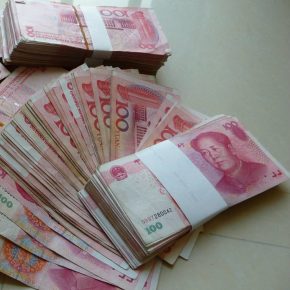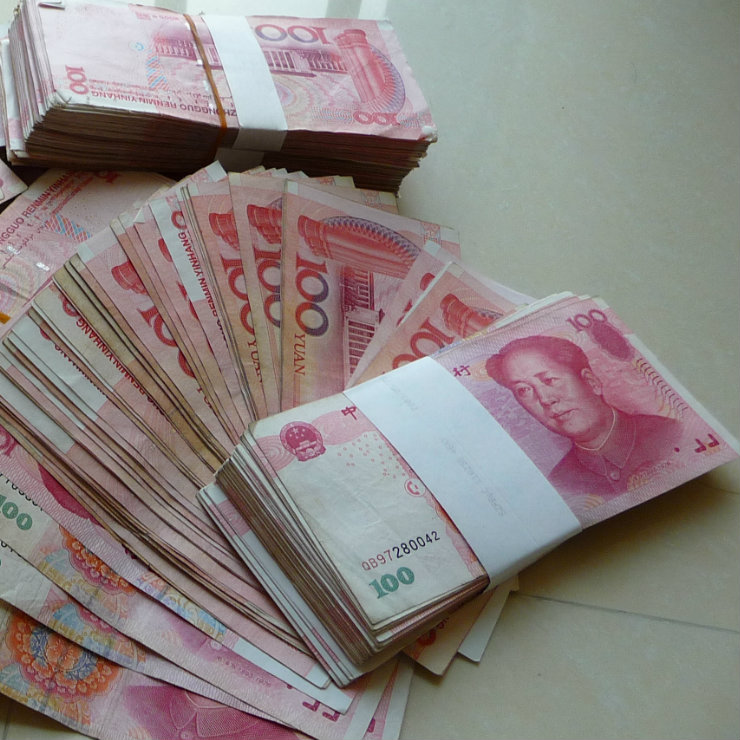Tydzień w gospodarce
Category: Trendy gospodarcze

(Chris, CC BY-NC-SA)
According to the Kiev information service Apostrophe, the draft of the agreement establishing a Chinese-Ukrainian free trade area was prepared in secret, and currently work on its framework is nearly finished.
“A meeting of a subcommittee for trade and economic cooperation took place within an intergovernmental committee back in 2015. Our subcommittee leaders have discussed the matter unofficially at a working level. Experts are analyzing this collaboration and preparing surveys both on the Ukrainian and our side. If Kiev has any proposals, China will be glad to hear them,” declared Chinese ambassador Du Wei during a press conference in Kiev. At the same time, Beijing declared its readiness to open borders to Ukrainian citizens, expecting Kiev to do same for the Chinese.
“China is prepared, at any time and depending on the wishes of both sides, to implement the principle of equality and mutually beneficial measures concerning the movement of people between the two countries, including a visa free regime,” Du Wei informed.
The speech delivered by the Chinese diplomat in April is an another attempt by China to bring up the issue of a free trade zone. The need to establish it was rather unexpectedly announced last spring by the then ambassador of China to Ukraine, Zhang Xiyun, during a debate on the perspectives of a New Silk Road.
The Chinese diplomat underscored the differences between the economies of China and Ukraine, and observed that their governments ought to create conditions for the real work of business. He mentioned the simplification of fiscal and customs procedures as some of the key tasks for the government, reported the Interfax agency.
The Ukrainian authorities were silent on the subject then. But the Chinese returned to the topic at the beginning of November 2016. During a conference on the perspectives of a New Silk Road railway, Chinese ambassador made a proposal to the Ukrainian government “to analyze the possibility” of creating a free trade area encompassing both countries. In the ambassador’s opinion, going through with an infrastructural project for a trading route connecting his country with Europe should attract Chinese investments to Ukraine.
Natalia Mykolska, representative of the Ukrainian government and deputy Minister of Economic Development and Trade, announced that the government had no intention to form a free trade area with China.
“Our priority is to develop a strategy for supporting exports, with guidelines for the liberalization of trade with various countries. On the basis of that strategy, we will determine the rules for dialogue with our strategic partners concerning free trade zones,” she responded to the Chinese proposal.
“When planning talks with Beijing, it is worth remembering that China does not make rush decisions. If a free trade area signal has been aired publicly, it means that a lot of thinking, discussions and internal debates have already taken place. It is doubtful that China will back out, as it is Beijing rather than Kiev that has time on its side,” said Oleh Ustenko of the Blazer Foundation.
China has the upper hand in the talks about the potential establishment of a free trade area, and it has powerful tools to exert pressure. It is possible that Ukrainian politicians embezzled USD3bn which was handed over to Kiev in 2012 by the Chinese government to buy crops grown on the Ukrainian steppes and for Ukraine to purchase agricultural equipment from Chinese manufacturers. The money vanished, Chinese never saw any grain. As a result, Beijing sued Ukraine before the arbitration court of the Grain and Feed Trade Association in London and, according to experts, stands to win the dispute.
Moreover, China keeps dropping hints that it has another strong argument in store.
“China has invested in Ukraine approx. USD7bn by purchasing government bonds. The task at hand is to activate this huge sum fully, to breathe life into agriculture, the energy sector, infrastructure, and other areas of the economy, which are desperate for it. This will in turn create jobs, bring tax and trade flows,” the Ukrainian government news agency Ukrinform described the speech made by the representative of the Chinese Embassy during the Chinese-Ukrainian business forum, in which he discussed areas of interest to China.
Ustenko thinks it’s rather unlikely that Ukraine would be able to avoid getting into China’s orbit but thinks that Ukraine still has a number of assets that can be used to secure a better deal. First of all, it has cheap labor. The average pay in Chinese cities of USD1,000 is five times as much as what is considered to be a decent wage for a Ukrainian worker. Also, the growth of the Chinese population acts in Ukraine’s favor, as the demand for agricultural products is increasing. Ukraine will not be met with fierce protection of the internal market, as it was during the negotiations with the EU and Canada. And Ukrainian farmers will be able to supply Chinese buyers with goods certified by EU organizations, i.e. of acknowledged quality.
In Ustenko’s opinion, China is a stable economic partner due to its long-term decision making, and Ukraine, located en route to the EU, is interesting to it in the long run. By relocating their production to Ukraine, Chinese companies can save up to 5-10 per cent, so the money involved is not to be frowned upon.
“The Chinese proposal comes as a response to Ukraine’s association with the EU, which opened the Ukrainian market to goods originating from Europe and put their producers at an advantage compared to the Chinese suppliers of corresponding items,” said Andrey Prichodko, an analyst at Ukrsotsbank.
The head of the Committee of Economists of Ukraine Andrey Novak believes that impoverished Ukraine is not of interest to China as a target market, but as a platform for delivering its production onto the EU market duty-free. “Ukraine has a free trade agreement with the European Union. For that reason China is extremely interested in setting up its production in Ukraine in order to later sell its goods on the absorptive and solvent European market,” he said. Novak believes that this solution might be beneficial to Ukraine, as it would guarantee an influx of investment.
Kristina Avramchenko of the Institute for Social and Economic Studies is convinced that the main beneficiary of a free trade area would be the Chinese economy. The volume of trade between China and Ukraine is large and amounts to 10 per cent of Kiev’s total trade exchange. China is the fourth largest buyer of Ukrainian exports and second largest supplier of goods after Russia.
“Ukraine exports mainly mineral resources, grain, sunflower oil and timber, while it imports finished products of Chinese industry, so the structure of the exchange is unfavorable to Ukraine at the moment. Should Ukraine enter into a free trade agreement, it ought to take care that this trend is not exacerbated,” the expert warns.
A free trade area might help Ukraine, provided that it starts producing something of interest to the Chinese buyer. It would remove the current customs barriers which put Kiev at a disadvantage today. The average tariff in the Most Favored Nation regime at the Chinese border is 12.33 per cent, but only 3.04 per cent at the Ukrainian border. For the time being China has many products which can be traded on the Ukrainian market: footwear, clothes, industrial products, electrical appliances, glass, plastics, and metals.
“A cursory analysis of the perspectives for a free trade area proves that China stands to gain more from such an agreement, which has to be approached with caution. To start with, Ukraine ought to decide on its economic growth strategy, and then follow its priorities in establishing free trade areas, yielding on the goods for which we can afford to abolish customs tariffs, and fighting from the very start for those positions which we want to become competitive in future,” argues Kristina Avramchenko.
In contrast, the chief economist at the European Bank for Reconstruction and Development (EBRD), Sergei Guriev, sees opportunities for Ukraine in a potential agreement with China. “We need not be afraid that China will flood Ukraine with its production,” he says and adds that Ukraine does not have a large internal market, and as a result its producers should orient themselves towards external markets and join global production chains.
“Kiev needs trade agreements with all its key partners. Even the tiniest bite of the Chinese market share means huge export volumes for a Ukrainian firm. Any new opportunities to enter that market translate into new jobs in Ukraine,” the EBRD’s Chief Economist went on in an interview given to Kiev’s Ekonomitschna Pravda.
According to Sergei Povazhniuk of the state analyst agency Ukrpromzovnishekspertiza, China enters into free trade agreements with its satellite states only, and Ukraine has nothing to offer to Beijing in terms of trade exchange.
“The only viable option for Ukraine is to convince China to treat us as a production platform and locate its factories here for them to produce goods for the EU market. They could be assembly plants, with some components being produced in Ukraine as well. To this end, Ukraine ought to discuss investment protection with China,” he said.

